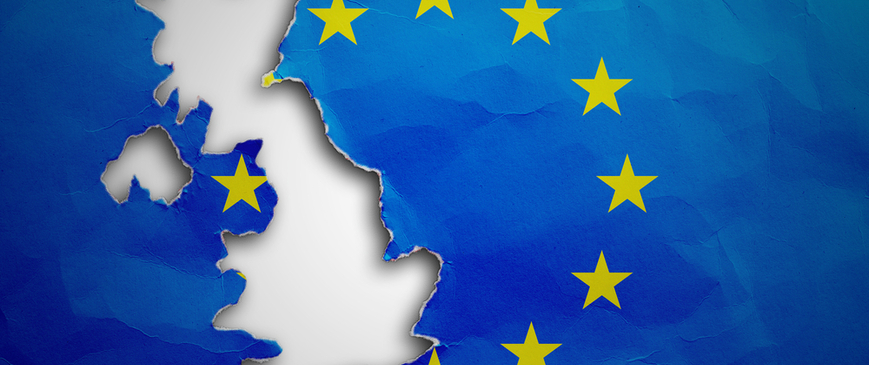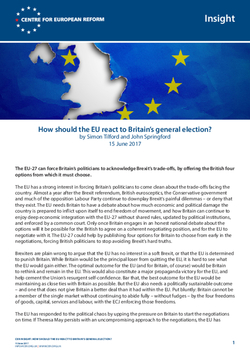
How should the EU react to Britain's general election?
The EU-27 can force Britain’s politicians to acknowledge Brexit’s trade-offs, by offering the British four options from which it must choose.
The EU has a strong interest in forcing Britain’s politicians to come clean about the trade-offs facing the country. Almost a year after the Brexit referendum, British eurosceptics, the Conservative government and much of the opposition Labour Party continue to downplay Brexit’s painful dilemmas – or deny that they exist. The EU needs Britain to have a debate about how much economic and political damage the country is prepared to inflict upon itself to end freedom of movement, and how Britain can continue to enjoy deep economic integration with the EU-27 without shared rules, updated by political institutions, and enforced by a common court. Only once Britain engages in an honest national debate about the options will it be possible for the British to agree on a coherent negotiating position, and for the EU to negotiate with it. The EU-27 could help by publishing four options for Britain to choose from early in the negotiations, forcing British politicians to stop avoiding Brexit’s hard truths.
Brexiters are plain wrong to argue that the EU has no interest in a soft Brexit, or that the EU is determined to punish Britain. While Britain would be the principal loser from quitting the EU, it is hard to see what the EU would gain either. The optimal outcome for the EU (and for Britain, of course) would be Britain to rethink and remain in the EU. This would also constitute a major propaganda victory for the EU, and help cement the Union’s resurgent self-confidence. Bar that, the best outcome for the EU would be maintaining as close ties with Britain as possible. But the EU also needs a politically sustainable outcome – and one that does not give Britain a better deal than it had within the EU. Put bluntly: Britain cannot be a member of the single market without continuing to abide fully – without fudges – by the four freedoms of goods, capital, services and labour, with the ECJ enforcing those freedoms.
Brexiters are plain wrong to argue that the #EU has no interest in a soft #Brexit
The EU has responded to the political chaos by upping the pressure on Britain to start the negotiations on time. If Theresa May persists with an uncompromising approach to the negotiations, the EU has no option but to respond in kind. But if Britain shifts track and moves quickly to reach a preliminary agreement on the Brexit bill and the issue of citizens’ rights, the EU should respond by laying out in public, and in some detail, the four options facing Britain. The best messenger would be Michel Barnier, the EU chief negotiator, who is close to the French and German governments, and has been careful to avoid any rhetoric that could be characterised as punishment.
The first option is that Britain can remain in the EU, but only on pre-renegotiation terms; that is, Britain would not benefit from the concessions won by David Cameron. The EU would need to be careful to stress that it will become harder for Britain to withdraw notification of Article 50 the longer the negotiations go on, to stop the UK using the threat of withdrawal as a negotiating strategy in the future, but be careful not to rule it out altogether. Both French President Emmanuel Macron and German Finance Minister Wolfgang Schäuble, have made welcome noises in this direction.
The second option should be for Britain to join the European Economic Area (EEA), or something closely modelled on it. The EU would need to make clear that this is the only ‘soft Brexit’ on offer and would require Britain to continue to abide by the EU’s four freedoms, including freedom of movement. The EU would also need to indicate how big Britain’s contributions to the EU budget would be under this scenario, and what rights it would enjoy compared to a member of the EU. By laying out what a soft Brexit actually looks like, the EU would help to force the British to focus on the actual trade-offs facing it: an EEA-type agreement would mean no votes on EU policy – a loss of sovereignty that the UK should find intolerable. This would heighten the attraction of staying in the EU over a ‘soft Brexit.’
The third option the EU should put forward is leaving the single market and negotiating a free trade agreement (FTA) largely in goods with the EU. The City would lose its passporting rights, leaving UK-based firms with similar access to EU financial markets as US ones. British airlines would be able to fly to and from the EU, but not between EU airports. There would be consultations on aligning regulations, but no requirement that the UK sign up to EU standards (although, in practice, the UK’s exporters would continue to abide by them). The UK would have to abide by competition and environmental rules and a court would settle any disputes between the UK and the EU. Such an agreement would not satisfy the UK’s comparative advantage in traded services, and would entail formidable economic costs. But the UK would gain some sovereignty over laws and migration. This option would need to include the offer of a transition deal under which Britain continued to enjoy single market and customs union membership but only if it respected the jurisdiction of the ECJ abided by freedom of movement and pay into the EU budget.
British politicians must openly debate Brexit’s dilemmas to reach consensus before EU&UK can negotiate
The final option would be leaving the EU with no transition deal in place and no trade agreement. In this case, British trade with the EU would be governed by World Trade Organisation (WTO) rules. The EU would need to make clear that not only would British goods face the EU common external tariff, but that British products sold in the EU would have to abide by EU standards to be sold. The EU would also need to demonstrate how it would minimise the damage to itself from Britain crashing out without a deal. For example, the EU should demonstrate how it would contain any resulting financial instability, perhaps by offering the UK access to EU markets for a further year, after which banks and clearing houses would have to move operations to the EU.
British eurosceptics would portray such an EU approach as bullying, but it would help bring clarity to the UK debate, by making it impossible for British politicians to persist with their strategy of ignoring the choices facing the country. It would strengthen the liberal wing of the Conservative Party. And it would force the Labour Party to outline how much economic damage it is prepared to do the country to control free movement. The UK would be forced to have a debate on the option it preferred – it might even lead to a general election fought on the issue. The EU can only negotiate once the UK has come to a consensus on how to proceed – which will only happen once British politicians openly debate Brexit’s dilemmas.
Simon Tilford is deputy director and John Springford is director of research at the Centre for European Reform.


Add new comment